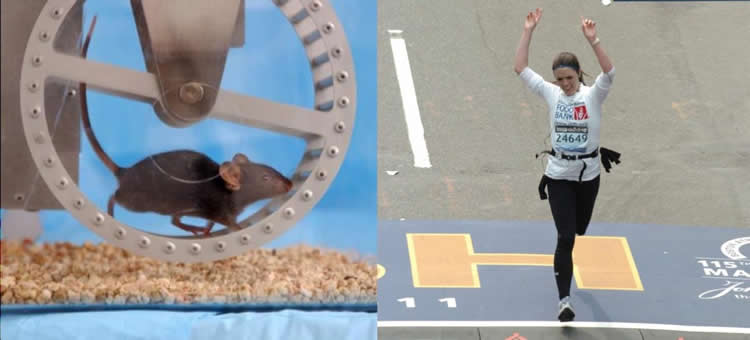Summary: Researchers document not only the behavioral and cognitive effects of a single exercise session, but also the neurochemical and neurophysiological changes that occur.
Source: IOS Press.
Even a single bout of physical activity can have significant positive effects on people’s mood and cognitive functions, according to a new study in Brain Plasticity.
In a new review of the effects of acute exercise published in Brain Plasticity, researchers not only summarize the behavioral and cognitive effects of a single bout of exercise, but also summarize data from a large number of neurophysiological and neurochemical studies in both humans and animals showing the wide range of brain changes that result from a single session of physical exercise (i.e., acute exercise).
There is currently enormous interest in the beneficial effects of aerobic exercise on a wide range of brain functions including mood, memory, attention, motor/reaction times, and even creativity. Understanding the immediate effects of a single bout of exercise is the first step to understanding how the positive effects of exercise may accrue over time to cause long-lasting changes in select brain circuits.
According to principal investigator Wendy A. Suzuki, PhD, Professor of Neural Science and Psychology in the Center for Neural Science, New York University, “Exercise interventions are currently being used to help address everything from cognitive impairments in normal aging, minimal cognitive impairment (MCI), and Alzheimer’s disease to motor deficits in Parkinson’s disease and mood states in depression. Our review highlights the neural mechanisms and pathways by which exercise might produce these clinically relevant effects.”
The investigators summarized a large and growing body of research examining the changes that occur at the cognitive/behavioral, neurophysiological, and neurochemical levels after a single bout of physical exercise in both humans and animals. They reviewed brain imaging and electrophysiological studies, including electroencephalography (EEG), functional magnetic resonance imaging (fMRI), functional near-infrared spectroscopy (fNIRS), and transcranial magnetic stimulation (TMS). They then turned to neurochemical studies, including lactate, glutamate and glutamine metabolism, effects on the hypothalamic-pituitary-adrenal (HPA) axis through cortisol secretion, and neurotrophins such as brain-derived neurotrophic factor (BDNF), insulin-like growth factor 1 (IGF-1), and vascular endothelial growth factor (VEGF). Neurotransmitter studies of monoamines (dopamine, serotonin, epinephrine and norepinephrine), acetylcholine, glutamate and gamma-aminobutyric acid (GABA) were reviewed, as well as neuromodulators such as endogenous opioids and endocannabinoids.

This extensive review resulted in three main observations. First, the most consistent behavioral effects of acute exercise are improved executive function, enhanced mood, and decreased stress levels. Second, neurophysiological and neurochemical changes that have been reported after acute exercise show that widespread brain areas and brain systems are activated. Third, one of the biggest open questions in this area is the relationship between the central neurochemical changes following acute exercise, that have mainly been described in rodents, and the behavioral changes seen after acute exercise reported in humans. Bridging this gap will be an important area of future study.
Co-author Julia C. Basso, PhD, post-doctoral research fellow, Center for Neural Science at New York University, commented, “The studies presented in this review clearly demonstrate that acute exercise has profound effects on brain chemistry and physiology, which has important implications for cognitive enhancements in healthy populations and symptom remediation in clinical populations.”
Source: Diana Murray – IOS Press
Image Source: NeuroscienceNews.com image is credited to Henriette van Praag and MarathonFoto.
Original Research: Full open access research for “The Effects of Acute Exercise on Mood, Cognition, Neurophysiology, and Neurochemical Pathways: A Review” by Basso, Julia C. and Suzuki, Wendy A. in Brain Plasticity. Published online March 28 2017 doi:10.3233/BPL-160040
[cbtabs][cbtab title=”MLA”]IOS Press “Can A Single Exercise Session Benefit Your Brain?.” NeuroscienceNews. NeuroscienceNews, 12 June 2017.
<https://neurosciencenews.com/brain-exercise-6892/>.[/cbtab][cbtab title=”APA”]IOS Press (2017, June 12). Can A Single Exercise Session Benefit Your Brain?. NeuroscienceNew. Retrieved June 12, 2017 from https://neurosciencenews.com/brain-exercise-6892/[/cbtab][cbtab title=”Chicago”]IOS Press “Can A Single Exercise Session Benefit Your Brain?.” https://neurosciencenews.com/brain-exercise-6892/ (accessed June 12, 2017).[/cbtab][/cbtabs]
Abstract
The Effects of Acute Exercise on Mood, Cognition, Neurophysiology, and Neurochemical Pathways: A Review
A significant body of work has investigated the effects of acute exercise, defined as a single bout of physical activity, on mood and cognitive functions in humans. Several excellent recent reviews have summarized these findings; however, the neurobiological basis of these results has received less attention. In this review, we will first briefly summarize the cognitive and behavioral changes that occur with acute exercise in humans. We will then review the results from both human and animal model studies documenting the wide range of neurophysiological and neurochemical alterations that occur after a single bout of exercise. Finally, we will discuss the strengths, weaknesses, and missing elements in the current literature, as well as offer an acute exercise standardization protocol and provide possible goals for future research.
“The Effects of Acute Exercise on Mood, Cognition, Neurophysiology, and Neurochemical Pathways: A Review” by Basso, Julia C. and Suzuki, Wendy A. in Brain Plasticity. Published online March 28 2017 doi:10.3233/BPL-160040






